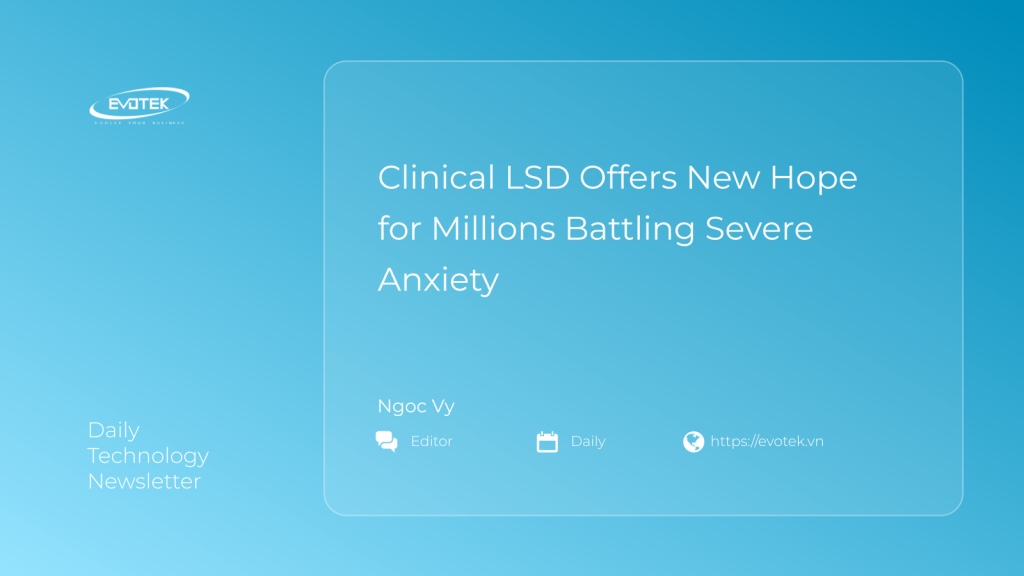For millions across the United States, generalized anxiety disorder (GAD) is a debilitating condition, often leading to profound fear and isolation that conventional treatments struggle to alleviate. However, pioneering research at the University of California, San Francisco (UCSF) is exploring a novel approach that appears to dramatically ease symptoms by fundamentally altering brain function.
Neuroscientist Dr. Jennifer Mitchell, leading this groundbreaking work at UCSF, is investigating therapies for various conditions including PTSD, depression, and addiction. Her latest endeavors are yielding surprisingly positive results with an experimental drug that could redefine anxiety treatment. The focus of this research? A carefully formulated pharmaceutical version of lysergic acid diethylamide (LSD).
Understanding Generalized Anxiety Disorder (GAD)
Generalized anxiety disorder is a chronic mental health condition characterized by excessive, uncontrollable worry that is disproportionate to the actual circumstances. This persistent state of apprehension can severely disrupt daily life, impacting an individual’s ability to work, manage household responsibilities, or maintain social connections.
Individuals with GAD often struggle with concentration, memory, and decision-making. Many also experience co-occurring depression, alongside physical symptoms like restlessness, chronic fatigue, and a pervasive sense of tension. The intense fear of public embarrassment or feeling trapped can lead to social withdrawal and avoidance of public spaces.
Distinguishing GAD from Everyday Stress
Unlike transient stress or nervousness, GAD manifests with clear and persistent physiological symptoms. The continuous activation of the body’s fight-or-flight system due to chronic worry floods the body with stress hormones, leading to sustained physical strain. Sufferers may experience muscle tension, rapid breathing, headaches, insomnia, tinnitus, and issues affecting cardiovascular, respiratory, and digestive systems.
Limitations of Current GAD Treatments
Traditional treatments for GAD typically involve medications such as Zoloft (sertraline) and Paxil (paroxetine), which work by enhancing and stabilizing serotonin levels in the brain. While these drugs can provide some relief, studies indicate they reduce anxiety symptoms by an average of only 1.25 points on a 56-point anxiety scale. For many patients, this reduction is insufficient to make a significant difference in their quality of life.
Why Psychedelic Therapy with MM120?
LSD, and other psychedelics, have demonstrated remarkable potential in shifting mood and emotional states within a controlled, therapeutic environment. This phenomenon has been observed in previous trials, such as those using MDMA (Ecstasy) for PTSD treatment.
The pharmaceutical LSD formulation under investigation is known as MM120. Its primary mechanism of action involves promoting neuroplasticity—the brain’s ability to reorganize itself by forming new neural connections. This process may enable the brain to alter entrenched negative thought patterns and enhance communication between various brain regions, thereby addressing the rigid thinking often underlying GAD.
Significant Efficacy Revealed in MM120 Trials
An earlier phase of the MM120 study, published in JAMA, evaluated the effects of a single dose over a 12-week period in approximately 200 participants suffering from moderate-to-severe GAD. The results were compelling: the drug significantly alleviated symptoms, reducing them by five to six points on the anxiety scale, a substantial improvement beyond placebo effects.
This level of improvement is considered highly significant, enough in some instances to reclassify moderate generalized anxiety disorder as mild, indicating a profound impact on patient well-being.
Managing Side Effects
Participants in the MM120 trials were closely monitored by medical staff post-administration. Side effects reported were generally mild to moderate and included hallucinations, visual distortions, nausea, and headaches. It is important to note that these effects were more prevalent at the highest dosage, which subsequent trials will avoid as it was not found to be more effective than lower doses.
Nausea, a common side effect with psychedelics, was mitigated by instructing participants to consume a light breakfast and proactively administering anti-nausea medication.
Recruitment Challenges for GAD Studies
Recruiting participants for GAD studies, particularly those with moderate-to-severe symptoms, presents unique challenges. Individuals who would benefit most from the treatment, often those with disabling anxiety reluctant to leave their homes, are paradoxically the least likely to engage in a clinical trial.
To overcome this, UCSF employs highly skilled clinicians who carefully screen potential participants, observing body language and meticulously building rapport. This empathetic approach is crucial for fostering trust, encouraging vulnerability, and facilitating the self-reflection necessary for the therapeutic process.
The ongoing research into MM120 offers a beacon of hope for millions burdened by generalized anxiety disorder, pointing towards a future where more effective and transformative treatments are available.

 日本語
日本語 한국어
한국어 Tiếng Việt
Tiếng Việt 简体中文
简体中文